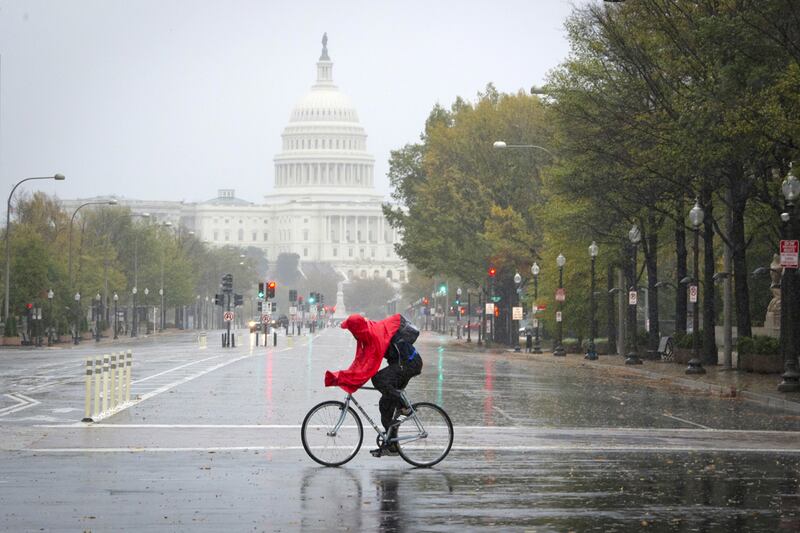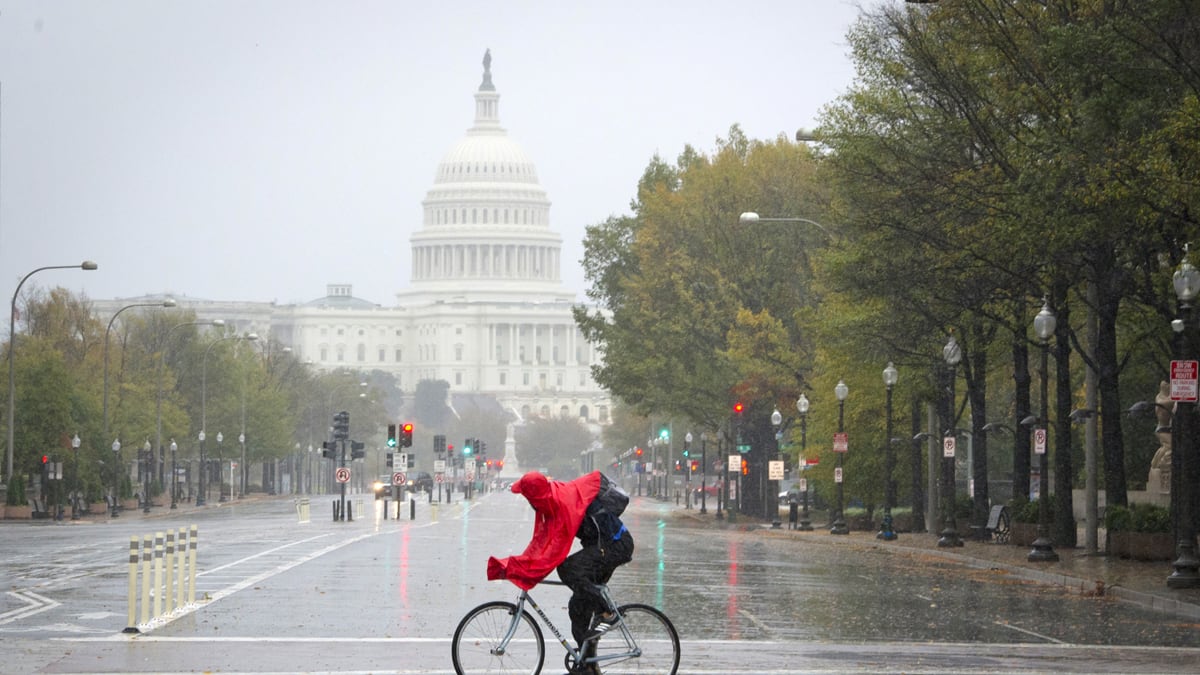One block from the White House, a forlorn figure in a blue blazer, head down, umbrella high, moves quickly down the windswept street. He is one of the brave few on the streets of Washington as sheets of rain marked the beginning of Hurricane Sandy’s assault on the capital.

"I was trying to attend the press briefing at the White House, my very first time," said Ben Bowman, a Northwestern University journalism grad student studying in Washington for a semester. "It turns out when they say the briefing is at 12:45, you've got to get there 20 minutes early."
The usually teeming Federal City is a ghost town. Not one person could be seen on Independence Avenue, where rows of bland neoclassical federal buildings have been shuttered. On Pennsylvania Avenue, along the heavily fortified pedestrian walkway in front of the White House, nary a visitor dared to stand up to the whipping winds and sideways sheets of Sandy-driven rain. Even the omnipresent protesters have taken the day off.
ADVERTISEMENT
And there was no news at the Newseum: its sidewalk glass cases were displaying worldwide newspaper front pages from yesterday.
Despite the extreme weather, a few hardy souls were gathered in the torrential rain on the National Mall, across from the Capitol, seemingly in no hurry. "We wanted to take a picture," a drenched Wand Yu-Hon explained, as if it were the most natural thing in the world. They had come from China.
“It took us so long to get here," her friend Olga added. "We don't have so much time."
They soon rejoined a bus of 16 Chinese tourists, whose next stop is Boston—which also is being hit hard by the hurricane.
A relative handful of people are working in D.C. because their jobs demand it. A 67-year-old man in a white construction hat was surveying a muddy field across from the Washington Monument. He works for the National Park Service on "erosion and sediment control."
Even as the Potomac River was threatening to overflow its banks by Tuesday, his job is to help prevent future floods by building cement walls. How does he feel about getting soaked? "It's normal. That's why they call it construction," said the official, who asked that his name not be used.
Standing with a male subcontractor, he allowed himself a sexist joke: "If it was easy, women would be doing it." But he quickly added that several women are working on the 17th Street Flooding Project.
One political note: the project is being funded by President Obama's much-derided stimulus program.
Outside the Corcoran Gallery of Art, clad in a yellow windbreaker, building engineer Jhonatan Hernandez was cleaning street gutters and sweeping leaves from the front of the stately building.
"We have to make sure the art stays at a certain temperature,” he said, leaning on a broom. “Some things you have to do to keep the building running.”
To fend off boredom, he’s taken to pushing his broom up the streets. “We're really just doing this because the city hasn't cleaned up." Hernandez was considering sleeping at the Corcoran on Monday night.
It’s a badge of honor in Washington when the federal government shuts down to be considered “essential personnel”—those who must report to work in hail, sleet, snow, hurricanes, and that other disaster, political shutdowns. It means you’ve made it to the top, that your presence is vital to a functioning democracy.
Yet even those folks get hungry.
Shawn Shenefield, general manager of the Upper Crust Pizzeria on Pennsylvania Avenue, tells me that the State Department had ordered 12 pizzas by midday. And he’s filled orders from the World Bank and the New Executive Office Building adjacent to the White House.
"The ones that are working, we're feeding them,” he observed.
The normally bustling restaurant was mostly empty, but Shenefield’s workers kept shoving pies in the oven. While he's losing the usual foot traffic of office workers buying lunchtime slices, his sales are up. "Those are $3.30 apiece. These are $200 or $300 orders. Oddly enough, it’s ending up better than a normal Monday."
Outside, on the bleakness of the avenue where the president lives, Washington looked anything but normal.






